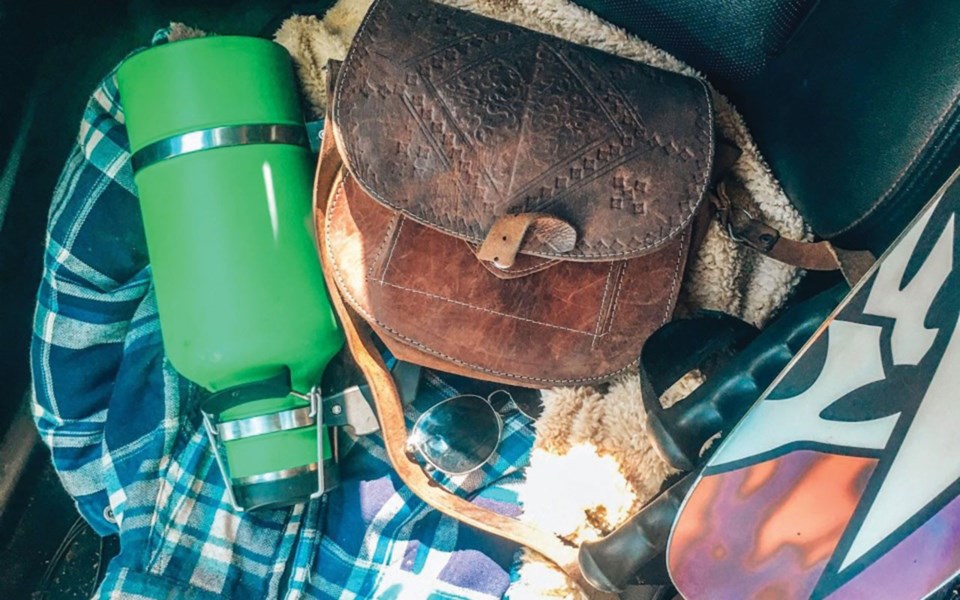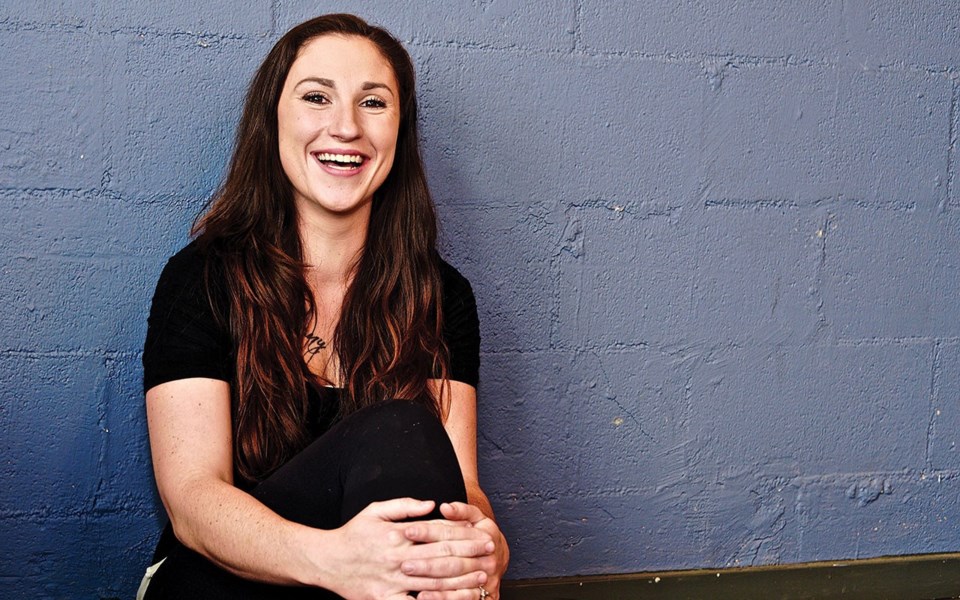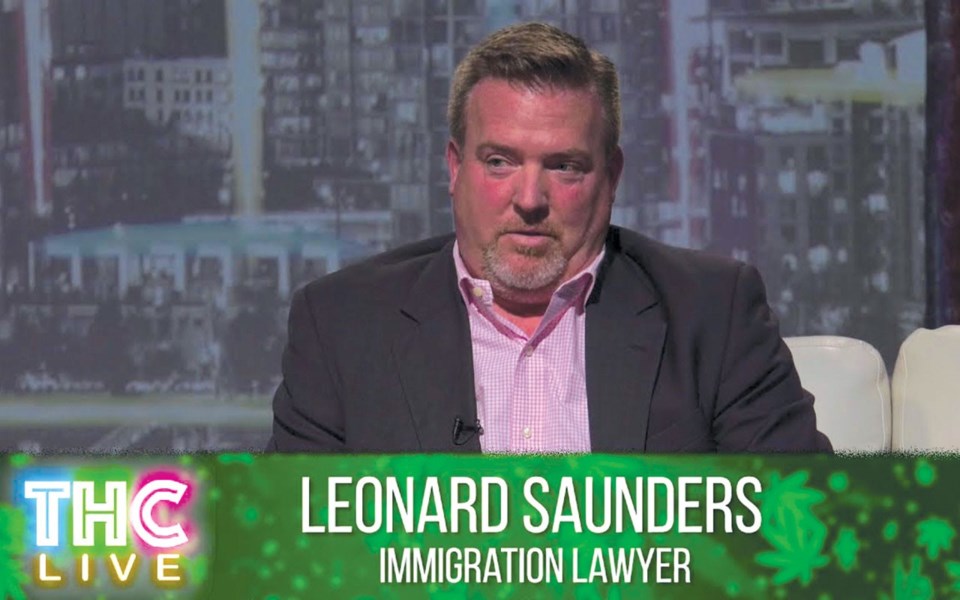
Each and every day, 400,000 Canadians cross the world's longest international border, into the United States, for work, travel, and well, that cheap gas and those outlet stores. Of those crossing, some are posed the uncomfortable question: "Have you ever smoked pot?" If you answer affirmatively, you may be banned from entering the U.S without a waiver, permanently. As in, forever.
A ski trip set ablaze
Danielle Lawson's laugh is almost as infectious as her personality. The part-time barista is finishing off her event coordinator certificate while juggling working within the ski industry. She's well-read, eloquent, with an eclectic taste in music and is a self-described fanatical cat-mom. She grew up in Kelowna, is sister to two older siblings and is the daughter to two retired middle-class teachers. Plainly put, Lawson could be your sister, your daughter or that one obsessive cat lover.
She's also been banned from entering the United States.
Lawson's border woes unraveled one fateful evening late last year while attempting to cross into the U.S. at the Oroville-Osoyoos border crossing. "I had my ski gear in the back, a thermos of coffee at the ready," recalls Lawson, who was traveling down to meet a group of friends for a backcountry ski trip near Mount Baker in Washington. "I was really stoked. We had planned this out for months. I'd been working 12 days in a row and had just finished an exam," she says. By all accounts, the trip was exceptional. The only problem? Lawson never made it.
"I've been in and out of the U.S my entire life, so crossings never really bothered me or made me anxious. They were always relatively smooth. And it started off pretty normal," she says. Lawson recounts that the U.S. Customs and Border Patrol (CBP) agent, a man she describes in his early 50s, was short with her from the get-go. "Immediately he was asking more in-depth questions than I was used to, such as, who these friends were and what did they do. I was tired and got flustered." When she mentioned her friends had travelled from cannabis-friendly places such as B.C., Washington and Oregon, Lawson says the border patrol agent visibly perked up. "He immediately asked, 'Do you smoke marijuana?'" I replied, 'No.' Then he asked, 'Do you have any marijuana on you?'"
Lawson says she paused, not because she was trying to conceal anything, but because she thought the question was ridiculous. "I mean, it's an international border crossing, why the hell would I have weed on me? I know better."
The pause inferred something to the agent, though. Lawson was soon on her way to secondary inspection. There, they unzipped her ski bag, searched her cooler and rifled through her purse, which was sitting in plain view of the officer. "At one point, he grabbed a round container of loose pills and asked, 'What are these?' she recalls, laughing. "And I replied, 'birth control.'" Lawson had condensed her three-month supply into a nondescript but very hip, teal-coloured container. "He wasn't exactly impressed," she says.
Sandwiched between that container, some loose change and lip balm was a tiny brown vial Lawson had forgotten about. "Seriously," she says, while intonating every syllable of the word. "Ser-ious-ly," she sighs. "I forgot that thing was there." That thing was a tincture of cannabinoid—otherwise known as CBD, a non-psychoactive molecule found in cannabis or hemp plants. Since CBD isn't psychoactive, it doesn't produce the "high" feeling commonly associated with its more famous cannabinoid cousin, THC. In Lawson's case, she had bought the tincture to help relieve symptoms of her social-anxiety disorder, triggered by her recent exam crunch and working in a socially-charged atmosphere.
"I've had anxiety all of my life," Lawson says, "And apart from therapy and skiing, this was the one thing that has helped it." Indeed, two clinical studies published in 2016 and 2019, respectively, have found that when CBD-rich oil is administered orally, it helps alleviate symptoms of anxiety, pain and insomnia. Lawson says she prefers not to smoke and opted instead for the small brown vial a few months before the doomed border crossing incident. "Honestly, there was probably a few drops left in there, so I wasn't using it and had forgotten about it. It's kind of funny to think about those few drops causing any problems," she says.
The border agent was not amused.
Immediately, Lawson was sent inside, where she surrendered her phone, gave a sworn statement, a pile of paperwork and was told she was barred from returning to the United States. Perhaps permanently. In tears, Lawson was confused. She bought the CBD legally in her native B.C. and was crossing into Washington, one of the first U.S states to legalize cannabis recreationally, in 2012. What crime did she commit?
A federal one.
Mixed signals: Federal vs. State laws
"You're playing with fire if you're entering the U.S. border with anything cannabis related," says Len Saunders, an immigration lawyer whose office has handled at least 3,000 border ban cases. Saunders, who has been practising law for 20 years and has an office in Blaine, Wash., does not represent Lawson, though he's represented similar clients with similar border woes. Saunders estimates what was once a rare case some 15 years ago has turned into him managing two such instances a week.
These stories span across all ages, genders and ethnicities, and don't particularly follow any well-worn pattern, except for the fact that cannabis, its paraphernalia and anything associated with its purchase warrants the bans.
One case Saunders represented involved a 21-year-old University of Guelph student who was caught in a similar position as Lawson with CBD earlier this year. Or a 57-year-old grandmother, attempting to visit her newly enrolled university student daughter, who when asked if she had ever been arrested, admitting to patrol agents she had been cited with marijuana possession—37 years ago, in 1982.

Even a glass pipe—deemed drug paraphernalia—with residue of cannabis can warrant a ban. As can admitting to working in the cannabis industry, or downloading a cannabis dispensary locator app. With cannabis legalization widespread across Canada since 2018, Saunders said he believes U.S. border agents will continue to ask that one pivotal question, "Have you ever smoked marijuana?" more frequently.
This, despite the fact that 10 states, including the U.S. capital, Washington D.C, have legalized recreational cannabis, while 29 states have legalized it for medicinal purposes. A 2018 signed federal farm bill—one could say oddly endorsed and signed by President Donald Trump—legalized hemp, the source of CBD, across all states, though its THC-carrying cousin cannabis remains completely illegal under U.S. federal law.
"Although medical and recreational marijuana is legal in some U.S. states and Canada," says Jason Givens, a public affairs specialist with U.S. Customs and Border Protection, "the sale, possession, production and distribution of marijuana remain illegal under U.S. federal law. Consequently, crossing the border with marijuana is prohibited and could result in fines, apprehension, or both."
Though CBD can be extracted from the federally legal hemp plant, since Lawson was caught before the Farm Bill went into effect, she is exploring legal options to see if she can get her lifetime ban reversed. In a similar fashion, Saunders' 21-year-old client had her lifetime ban recently dropped, though officials did not provide an official reason.

Why the woes?
There are some 60 reasons as to why you may be deemed ineligible to enter the United States, according to Act 212 of the Immigration and Nationality Act. Since border agents are federal agents and the entire border area is federally regulated, these reasons can range from being deemed a terrorist, money launderer or being affilated with known communist or Nazi parties. A few of these also pertain to drugs, and cannabis is considered federally to fall under Schedule I by the Controlled Substance Act—the same classification given to heroin, meaning it has "no medicinal value and has a high potential for abuse." In comparison, cocaine is rated less offensive, as a Schedule II drug.
Anything apprehended by federal officials (which, mind you, have jurisdiction to have border patrol checkpoints up to 100 miles [160 kilometres] away from the border and into the United States) whether it is physical matter, paraphernalia or a confession of prior smoking or arrest, is considered a crime.
If this all sounds confusing, it's because it is.
The U.S. policy is deeply nuanced, often bureaucratic and a shining example of the fragmented reality of a political system that is often torn between trying to rule under federal law while allowing individual states to self-govern autonomously. One just needs to look at the recent abortion bans in various states deemed federally illegal due to the 1973 landmark Roe v. Wade, or the previous federal gay-marriage ban to see the troubling power dynamic between federal and state governments.
And while marijuana is legal on both sides of the border, in B.C. and in Washington state, it basically boils down to this when you're on federal land: Any Canadian at the border can be permanently banned from entering the U.S. if they're determined to be a drug abuser, addict or if they have a previous marijuana conviction. Even just admitting to smoking or possessing marijuana somewhere where it's legal, such as Canada, can be a reason to be banned.
"It's basically black and white," says Sanders. "If you admit to a U.S. border officer at a U.S. port of entry that you've smoked marijuana in the past, whether it's in Canada or the U.S., you will be barred entry for life to the United States."
These Canadians can still work around the ban by applying for temporary waivers to visit the U.S., however their visa-free travel access is permanently revoked under current immigration laws. The waivers are costly, at $600, and can take up to 18 months to complete.
Caught in a lie
If admitting to smoking cannabis is bad enough, being caught lying about it is far worse. If, for example, you lied about your cannabis use, but then border officials found social media posts of you toking or standing next to a cannabis plant, you can be charged with misrepresentation or fraud, which are much more difficult to have waived.
Immigration lawyer Kevin Jones says he's had "three people caught in the last month" and "barred for life" after they had admitted to consuming cannabis. An unsuspecting traveller gets scrutinized by the CBP officer and they are pulled into secondary inspection, much like in Lawson's case. "Maybe they get a little bit too feisty with CBP," says Jones, "... or maybe they don't like the person. That's when they start to dig." At this point, without a lawyer present, someone may feel pressured to answer any questions.

Experts say that CBP officers have a plethora of tools at their disposal to uncover the truth. This can range from asking you to unlock your phone, scour social media, read articles you've written or commented on and so forth. The U.S. Patriot Act also permits border officials to access in-depth financial information, such as credit card data. Recently, questions have been raised over whether U.S. agents will have access to Canadian information about the purchasing of recreational cannabis within Canada.
So, it's important to note that, at the border, CBP officials are both judge and jury and have almost complete discretion to admit or bar you from entry. Their individual viewpoints on cannabis, and if they decide to bring it up as part of their routine questionnaire, varies between agents and checkpoints.
Experts don't recommend lying to agents because of the risk of being caught. Even if you receive a shorter ban or if in the future bans relating to cannabis are overturned, your official record will always reflect that you lied to officers, which will lead to "extensive interrogation at the border for the rest of your life."
Experts say it's better to simply refuse to answer questions. A Canadian has no legal obligation to answer any questions posed by a border officer. However, you will most likely be refused entry and be flagged in the CBP database, which may result in subsequent lengthier border patrol questioning and routine secondary inspections.
If you do get pulled into secondary, or are waiting in pre-flight clearance at an airport, you also have the right to revoke your request to enter the U.S. if you do not wish to answer questions posed by Customs Officers. However, like a "refusal to answer," you will likely be flagged, which may mean closer scrutiny during your next border crossing.

Resolutions: The Future
"The best way for Canada to deal with this issue is to be proactive," says John Hudak, director and cannabis expert at the Center for Effective Public Management at the Brookings Institute in D.C. "Designing information campaigns in dispensaries, on roadways near airports and borders, and in airports themselves, is an important step," he says. Indeed, some border patrol checkpoints have erected signs warning Canadians, though they have little verbiage and can be easily misconstrued to simply mean that one "cannot smoke cannabis at the border."
In this case, knowledge is power, and if a traveller is so inclined to research before departure, the Government of Canada warns that, "Previous use of cannabis, or any other substance prohibited by local law, could result in a traveller being denied entry to their destination country."
The same is true if an American tries to bring cannabis into Canada, which the government states, "Can result in serious criminal penalties both at home and abroad." Though a quick search of how many Americans had been banned from Canada due to cannabis yielded few results.
Hudak also suggested that officials could install "amnesty boxes" at border crossings—places where Canadians can deposit their marijuana before travelling south. Think of it as your bottle water disposal unit at the airport before security, without the need to try and consume it before crossing over. "These efforts will not be perfect," says Hudak."They will help individuals who are genuinely unfamiliar with policy, or will help motivate people to do the right thing."
Other examples include better signage. One such example is at at the Mount Bachelor ski resort in Oregon, which operates on federal land. When the state legalized recreational marijuana in 2014, the resort noticed many clients smoking cannabis in their parking lots, thinking it was legal. It was not. A large sign was quickly erected near chairlifts and in other visible areas reading, "It is illegal to smoke in public. You are in public now."
Though Canadians will still have to keep tabs on the changing U.S. political climate, there's been recent signs at the federal level that cannabis laws may be loosening. Just last month, the U.S. House of Representatives passed a historic marijuana banking bill, which lets federally-insured banks work with cannabis dispensaries and companies in states that have legalized marijuana. Though it's a small step, it's an important one, since it's the first-ever federal vote on a stand-alone cannabis bill, which may signal a change for future cannabis-related measures.
In addition, back in June, the House also approved a measure to prevent the Department of Justice (DOJ) from interfering with state marijuana laws, including those allowing recreational use, cultivation and sales—a 180-degree turnaround from the previous DOJ memo from ousted Attorney General Jeff Sessions, who had made it his mandate to crack down on cannabis-related crimes. That measure was approved 267-165, considered a whopping feat for legalization supporters and indicative of how much growing support there is on the federal level to change cannabis policies.
Still, with a looming election and a currently tough U.S. political climate, the border will remain as is for now. So the best advice to Canadians is: leave anything cannabis related, whether it's acknowledgement of prior consumption, that pipe in your pocket, the CBD oil in your bag or that weed tea—on Canadian soil.



